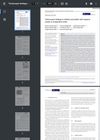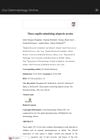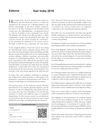 3 citations,
November 2016 in “Clinical Pediatrics”
3 citations,
November 2016 in “Clinical Pediatrics” A girl with Crohn's disease developed hair loss from her medication, which improved with treatment but later returned.
 58 citations,
January 2018 in “International Journal of Women's Dermatology”
58 citations,
January 2018 in “International Journal of Women's Dermatology” Alopecia significantly lowers women's quality of life, with psychological and social challenges, highlighting the importance of early treatment and support.
 26 citations,
July 2019 in “Dermatology and Therapy”
26 citations,
July 2019 in “Dermatology and Therapy” The conclusion is that genetic testing is important for diagnosing and treating various genetic hair disorders.

Combining epinephrine with a steroid may help regrow hair in severe alopecia areata cases.
 April 2024 in “Journal of cosmetic dermatology”
April 2024 in “Journal of cosmetic dermatology” Children with alopecia areata have more exclamation mark hairs and fewer yellow dots than adults.
 December 2023 in “Journal of dermatology”
December 2023 in “Journal of dermatology” Adults and adolescents with severe alopecia areata are willing to take significant health risks for a better chance of hair regrowth.
 39 citations,
August 2016 in “Journal of Dermatological Treatment”
39 citations,
August 2016 in “Journal of Dermatological Treatment” Stem cell therapy may help treat tough hair loss cases.
 December 2023 in “Research Square (Research Square)”
December 2023 in “Research Square (Research Square)” People with Down syndrome have higher rates of certain immune-related conditions and need special medical attention.
 1 citations,
January 2019 in “Medical principles and practice”
1 citations,
January 2019 in “Medical principles and practice” A boy's hair loss improved after tumor removal and vitamin D treatment, but hair loss returned despite normal vitamin D and no tumor regrowth.
 4 citations,
January 2023 in “The journal of allergy and clinical immunology/Journal of allergy and clinical immunology/The journal of allergy and clinical immunology”
4 citations,
January 2023 in “The journal of allergy and clinical immunology/Journal of allergy and clinical immunology/The journal of allergy and clinical immunology” Biologics, especially Dupilumab, are effective and safe for treating severe childhood eczema.
 March 2015 in “Polish Journal of Public Health”
March 2015 in “Polish Journal of Public Health” Blood vessel patterns in skin diseases relate to certain blood markers in systemic sclerosis but not in psoriasis or psoriatic arthritis, and may indicate circulation issues in alopecia.
 3 citations,
January 2020 in “Clinical dermatology review”
3 citations,
January 2020 in “Clinical dermatology review” Trichoscopy is useful for diagnosing hair and scalp disorders in people with darker skin.
 November 2024 in “Health Science Reports”
November 2024 in “Health Science Reports” Light/laser therapy can effectively increase hair density in some types of alopecia, especially androgenic alopecia and alopecia areata.
 May 2024 in “Frontiers in Immunology”
May 2024 in “Frontiers in Immunology” Type-2 immunity may influence skin diseases and could be targeted for treatment.
 1 citations,
October 2000 in “Pediatrics in Review”
1 citations,
October 2000 in “Pediatrics in Review” The document says that hookworms are treated with mebendazole and stress-related hair loss usually gets better in 6 months, while other hair loss types have specific treatments.
 45 citations,
April 2019 in “International Immunology”
45 citations,
April 2019 in “International Immunology” The study concluded that immune cells attacking hair follicles cause hair loss in alopecia, with genetics and environment also playing a role, and highlighted the potential of certain treatments.
 71 citations,
January 2015 in “The Scientific World Journal”
71 citations,
January 2015 in “The Scientific World Journal” Insulin resistance may contribute to various skin diseases and treating it could improve skin health and prevent more serious conditions.

The document is a detailed guide on skin conditions and treatments for dermatologists.
 1 citations,
January 2021 in “Our Dermatology Online”
1 citations,
January 2021 in “Our Dermatology Online” A scalp infection can look like alopecia areata and get worse if treated incorrectly.
 6 citations,
May 2017 in “InTech eBooks”
6 citations,
May 2017 in “InTech eBooks” Hair loss can cause serious mental health problems and treating it requires a team of experts.
 1 citations,
September 2015 in “Clinics in Dermatology”
1 citations,
September 2015 in “Clinics in Dermatology” Children's skin diseases and treatments differ from adults and require specific approaches.
5 citations,
January 2020 in “Acta dermatovenerologica Alpina, Pannonica et Adriatica (Tiskana izd.)” Injecting platelet-rich plasma or applying it with a laser or microneedling can treat hair loss effectively. The laser and microneedling methods cause less pain.
35 citations,
October 2017 in “JAMA dermatology” Children with alopecia areata should only have thyroid screening if they have Down syndrome, a history of atopy, family history of thyroid disease, or signs of thyroid problems.
 March 2022 in “IntechOpen eBooks”
March 2022 in “IntechOpen eBooks” Botulinum Neurotoxin-A can treat acne, oily skin, rosacea, hair loss, prevent scars, relieve nerve pain, reduce excessive sweating, and manage psoriasis, but more trials are needed to confirm its effectiveness.
 391 citations,
January 2010 in “Journal of The American Academy of Dermatology”
391 citations,
January 2010 in “Journal of The American Academy of Dermatology” Half of people with Alopecia Areata may see hair regrowth within a year without treatment, but recovery is unpredictable.
 17 citations,
June 2016 in “Croatian Medical Journal”
17 citations,
June 2016 in “Croatian Medical Journal” Patients with chronic graft-versus-host disease often have skin problems like vitiligo and alopecia areata.
 2 citations,
January 2010 in “International Journal of Trichology”
2 citations,
January 2010 in “International Journal of Trichology” The Hair India 2010 conference introduced a new hair loss classification and highlighted advanced diagnostic techniques in trichology.
 June 2024 in “Australasian Journal of Dermatology”
June 2024 in “Australasian Journal of Dermatology” A 13-year-old boy with a rare scalp condition improved significantly with isotretinoin, minoxidil, oral steroids, and antiseptic shampoo.
36 citations,
December 2021 in “The journal of allergy and clinical immunology/Journal of allergy and clinical immunology/The journal of allergy and clinical immunology” Two drugs, ritlecitinib and brepocitinib, improved scalp hair loss condition markers.
 46 citations,
January 2015 in “Pediatric Rheumatology”
46 citations,
January 2015 in “Pediatric Rheumatology” Skin symptoms are important for diagnosing and managing juvenile-onset systemic lupus erythematosus and usually get better with treatment.



























